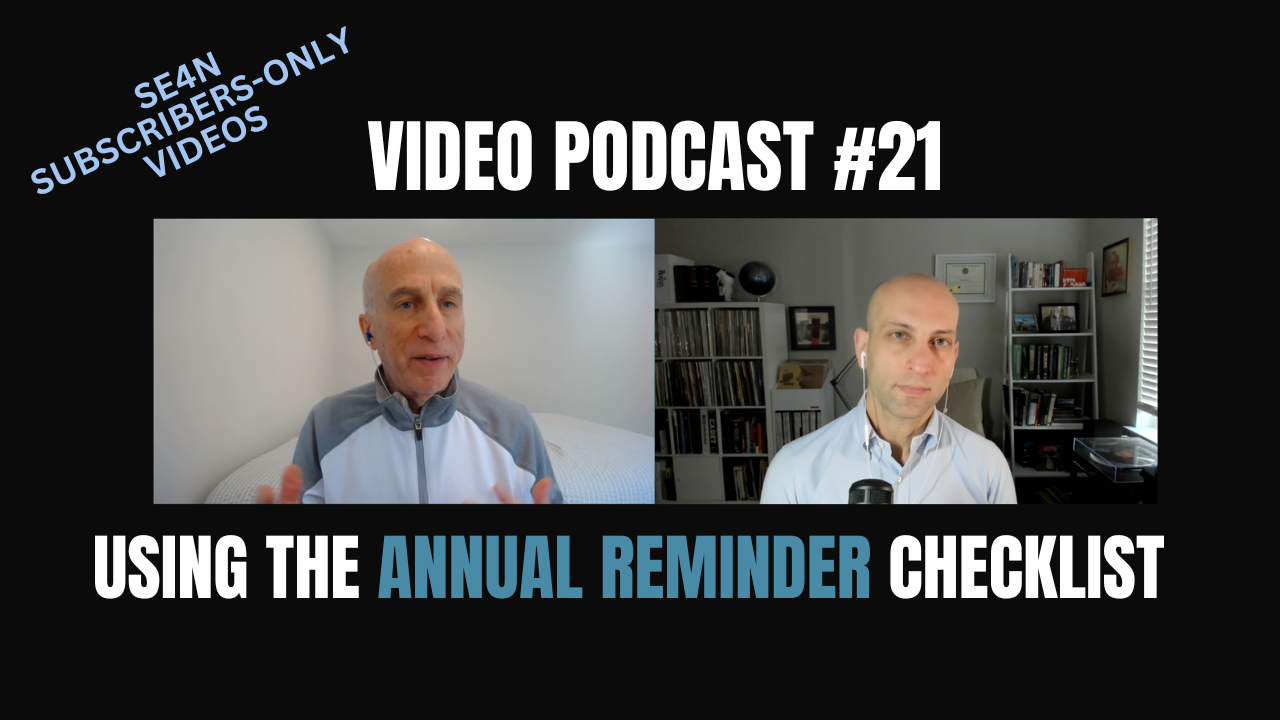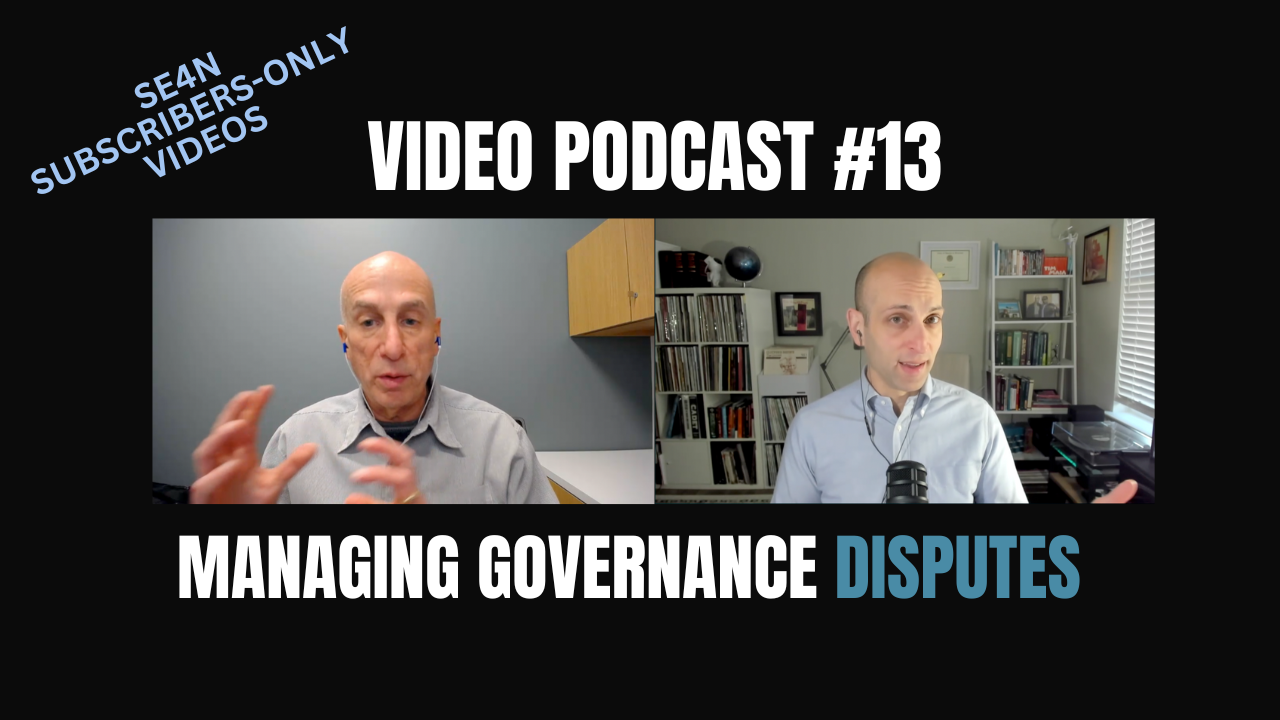
Blog.
Most Recent Posts

Video Podcast: Using the Nonprofit Management Annual Reminder Checklist
Ben and Mike discuss the areas covered by SE4N’s Nonprofit Management Annual Reminder Checklist, how this checklists compares with and complements other management tools and resources, assigning responsibility for using the checklist each year, and more.

Using Checklists to Avoid Nonprofit Management Missteps
Nonprofit organizations have many operational, administrative, and programmatic details to review and evaluate on a regular basis. Some of these details are minor (small but easy to miss) and some are major (large, complex, and extremely important). Missing any one of these details can be a potential tripping hazard and an opportunity to evaluate, make changes, and plan for improvements. Developing and implementing simple management tools like a reminder checklist will enhance review and evaluation processes with little effort.

CHECKLIST: Nonprofit Management Annual Reminder Checklist
This checklist is intended to remind nonprofit Executive Directors, CEOs, CFOs, COOs, and other managers, officers, and Board / committee members to regularly evaluate, renew, and update documents, activities, policies, and practices to better meet the organization's changing needs. The document is organized by key fiscal, financial, governance, and operational areas, including Funding, Administration, Human Resources, Professional Services, Financial Reporting, Financial Policies & Procedures, and Governance.

Building a Contingency Plan for an Unexpected CEO Departure
Nonprofit organizations face many risks that can damage an organization’s hard-earned reputation, deplete financial assets, and generally cause operational mayhem. One often-ignored risk is the possibility of an unexpected departure of the “chief staff” position (CEO, Executive Director, etc.). Organizations that have risk mitigation procedures and contingency plans in place will fare better than organizations that are caught off guard.

VIDEO PODCAST: Managing Nonprofit Governance Disputes
Ben and Mike discuss how corporate governance disputes tend to arise in nonprofit organizations, how building a culture of open debate and discussion on the Board of Directors and throughout the organization can help prevent disputes from getting out of control, navigating D&O insurance and the decision whether to report a claim, considerations for managing disputes once they've arisen, and more.

VIDEO Q&A for Subscribers: December 2024
Ben and Mike answer questions from subscribers about implementing a CEO / Executive Director succession or transition plan, how to handle errors in an already-filed Form 990, planning for the possible loss in grant funding or a change in funding sources, and whether a person can old two officer positions simultaneously.
![Five Ways Nonprofit Board Actions Can Be Challenged Under Law [SUBSCRIBERS-ONLY]](https://images.squarespace-cdn.com/content/v1/5e6ccadfb4659c1d51df14d5/1730307595287-W3L74FMFRZEHZ01AZV15/pexels-zachary-caraway-646894910-17630959.jpg)
Five Ways Nonprofit Board Actions Can Be Challenged Under Law [SUBSCRIBERS-ONLY]
It is well-known that Board members are subject to fiduciary duties in their oversight and decision-making role, among other rules that apply to nonprofit organizations. However, the practical reality of how these requirements are scrutinized, applied, and enforced is less understood. This article provides a brief overview of some common ways that Board decisions and actions could be challenged in court.
![VIDEO Q&A for Subscribers: August 2024 [SUBSCRIBERS-ONLY]](https://images.squarespace-cdn.com/content/v1/5e6ccadfb4659c1d51df14d5/94ba66db-acce-4fa3-8f98-f369cd6d48d0/SE4N+Video+Q%26A+2024-08.png)
VIDEO Q&A for Subscribers: August 2024 [SUBSCRIBERS-ONLY]
Ben and Mike answer questions from subscribers about whether fixed assets and restricted funds can count toward a nonprofit organization's operating reserves, the pros and cons of taking over an existing 501(c)(3) organization rather than starting a new one, how abstentions are counted in a Board vote, and whether an organization should use a credit card or debit card.

Why Gift Acceptance Policies are Important and Must Be Periodically Reviewed and Updated
A gift acceptance policy fills many important roles for a nonprofit organization, including acting as a set of guidelines for fundraising efforts, a tool for risk management, and a protector of the organization’s good governance practices, mission, ethics, reputation, and culture. These characteristics are naturally sensitive to unexpected change and evolving economic conditions, so regularly reviewing and updating your organization’s gift acceptance policy is essential.
![Seven Key Steps for Managing Nonprofit Corporate Governance Disputes [SUBSCRIBERS-ONLY]](https://images.squarespace-cdn.com/content/v1/5e6ccadfb4659c1d51df14d5/1684850686845-BLMLI9MTHUVKFV4FHBS9/pexels-alex-neri-6721364.jpg)
Seven Key Steps for Managing Nonprofit Corporate Governance Disputes [SUBSCRIBERS-ONLY]
For most nonprofit organizations, it is a rare occurrence for internal corporate governance disputes to escalate to the point of litigation. However, court cases are sometimes unavoidable. A notable D.C. Court of Appeals decision addressed several important issues related to corporate governance challenges and illustrated some key steps nonprofits can take to better manage these disputes.
![The Case for Capitalizing Portable Electronic Devices (PEDs) [SUBSCRIBERS-ONLY]](https://images.squarespace-cdn.com/content/v1/5e6ccadfb4659c1d51df14d5/1708829753340-FXKX30FD1R3ASK09NL3B/nastya-dulhiier-Ihi56-Qs39U-unsplash.jpg)
The Case for Capitalizing Portable Electronic Devices (PEDs) [SUBSCRIBERS-ONLY]
Nonprofit organizations are now accustomed to living with changing conditions. Change can come in many different forms, from dramatic and fast (remote working, inflation) to subtle and out of sight (technology, rules, and regulations). A noteworthy example involves portable electronic devices (PEDs), which have seen subtle steady changes leading to lower cost with expanded performance and capacity. These changes have led to new risks that deserve special attention.

Internal Accounting Controls and the Importance of Perception
Internal accounting controls are an everyday fact of life. They protect nonprofit organizations from many types of risks ranging from theft, fraud, and diversion of assets, to errors and mistakes, to highly sophisticated scams and cyber security threats. Organizations must maintain vigorous and sustainable internal accounting control systems. However, if the perception of an organization’s internal accounting controls is weak, its ability to battle these threats will be greatly reduced.

If Theft or Fraud Happens, Do Not Make It Worse with Silence
It’s hard to find a nonprofit organization that has not been hit by a theft, fraud, or other material diversion of assets. It almost seems inevitable to happen at some point. We must continue to strengthen internal controls and stay vigilant, searching for evolving weaknesses and risk exposures. If a theft or fraud does happen, it is important to be fully transparent with messaging and avoid the tendency to go silent.

Q&A #88 – Does theft or fraud need to be reported on the Form 990?
Whether theft or fraud must be reported on the Form 990 depends on the amount, and also on the role of the individual who committed the offense. Part VI, Line 5 of the Form 990 (on page 6) requires organizations to disclose whether they became aware of a “significant diversion of the organization’s assets.” Also, if assets were stolen by a “disqualified person,” this must be reported as an “excess benefit transaction” on Part IV, Lines 25a and 25b (on page 4) and Schedule L.
![Capacity Risks are Real and Need Attention [SUBSCRIBERS-ONLY]](https://images.squarespace-cdn.com/content/v1/5e6ccadfb4659c1d51df14d5/1709040218849-D6XI3S7NFO1BT359S2QO/wheelbarrows-4518854_1920.jpg)
Capacity Risks are Real and Need Attention [SUBSCRIBERS-ONLY]
Nonprofit organizations need to wake up to the fact that capacity challenges are real and can lead to increased risk exposure. Capacity risks come from many different sources and affect organizations in different ways and at times that are not predictable. Growth and unexpected disruption are the two biggest factors impacting capacity. Expanding risk management practices to include assessments related to capacity will help your organization to meet these twin challenges safely and effectively.